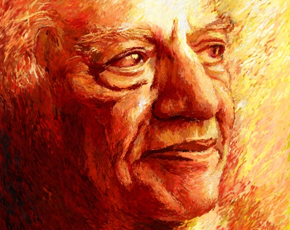
My earliest recollection of Faiz Ahmad Faiz is of an amiable man sitting in our lounge with my grandfather, speaking softly, deep in thought and discussion. He was not someone who originally took shape in my life through lilting lyrics and invigorating poetry. My entire family and especially my grandfather spoke fondly of him, narrating amazing stories of friendship, heartache, of their struggle and their cause.
It was 1943, the Second World War was in full throes, when my grandfather – a comrade belonging to Bacha Khan’s Surkh Posh Tehreek – went to the Cecil Hotel in Abbottabad to meet the renowned humanist and poet Faiz Ahmad Faiz who was visiting the city. It was the start of an association which eventually became our family legacy. Now that exactly 28 years have gone by since this great thinker left us, it is time to look back and understand the aspirations he had envisioned for his people.
Perhaps the greatest Asian poet of the common man, he was born to a life of artistic pursuits and strove to serve humanity. From early childhood, I had so wanted to meet this person whose pictures hung everywhere from our living room and TV lounge to my father’s study – portraits of a kindly looking man, with a soft smile playing on his lips and twinkling eyes. There are other pictures too: some taken at my father’s wedding with the poet actually solemnising the Nikkah. There is one image though that captures the fervour of the leftist movement with the fellow comrades of the Pakistan Socialist Party’s Anees Hashmi and Mohammad Hussain Ata (my grandfather) at the Pakistan Times head office. Engrossed in a discussion, these men embody what Marxists before them failed to really exemplify – a socialist idealism devoid of leftist rigidity, an all-encompassing passion for humanity, and a vision of real hope. These were times when men acted with selfless devotion and an unwavering love for their fellow countrymen.

I often read the awe-inspiring speech that he gave while receiving the Lenin Peace Award. Obsolete though it might seem, not once has it lost its relevance or vigour. He delivered it with a humility that emanated honesty and inspiration. The visionary spoke of ills that were plaguing the society and if truth be told the affliction still remains ever so potent and strong. While addressing his attentive audience, he lamented that it was oppression which eliminates humanity, a distinguishing feature of man from animal. Man; who is the sum total of thought and perception, truth and intelligence, pride and valour. He said: “War today does not mean bloody tribal strife. Nor do we mean by peace today merely that bloodshed should come to an end. Today, war means the annihilation of the human race itself. Today, peace is the precondition for the survival of humanity as such. On these two words — annihilation or survival — depends the continuation or culmination of human history. On these two words depends the destruction or survival of the human habitat. Again, man did not have, until our own time, sufficient control over natural resources and the forces of production to take care of the needs of all groups and clans. Thus, there was some justification in the past for the grab-and-run loot, which has been so much a part of human history. That is not the situation today.”


The poetic genius that was Faiz has never been more relevant or vital than it is now. Ask the extreme right groups who were so favoured by the Western imperialist bullies during the cold war era and acting as a private army against what was considered free thought. It is now dawning upon them that no truer words were penned when Faiz wrote:
This thought keeps consoling me: though tyrants may command that lamps be smashed in rooms where lovers are destined to meet, they cannot snuff out the moon, so today, nor tomorrow, no tyranny will succeed, no poison of torture make me bitter, if just one evening in prison can be so strangely sweet, if just one moment anywhere on this earth. (A Prison Evening: Translated by Agha Shahid Ali)
Politicians vociferously speak of hope and humanity, while transfusing more depravity in their cliques. Faiz’s poetry hits the right chords when it portrays the wantonness of authority, the predicament of the common man leading to a society filled with utter despondency and cacophonic discord. Truth is so beautifully rendered in this verse and how well suited it is given the current dire state of affairs of this country:Hum khasta tanon se mohtasebo kia maal manaal ka poochtay ho Jo umr se hum nay bhar paaya woh samnay laaye detay hain Daman main hay musht-e-khaak-e-jigar, saaghar main hay khoon-e-hasrat-e-mae’ Lo hum ne daaman jhaar dia, lo jaam ultaaey detay hain
We are a generation in love with the idea of rebellion, revolution and awe-inspiring hope. Yearning to be a part of something great, we wear impressions of visionaries like Che Guvera emblazoned on our handbags to our T-shirts. Yet we can neither make heads nor tails of who these people really were and more importantly what they actually stood for. Isn’t it time that we find inspiration through their body of work? Together can we not breathe life into their cause one more time – for the greater good of the people?Faiz Ahmad Faiz died on 20 November 1984.

The views expressed by this blogger and in the following reader comments do not necessarily reflect the views and policies of the Dawn Media Group.










































